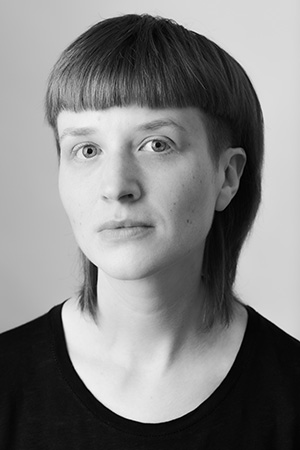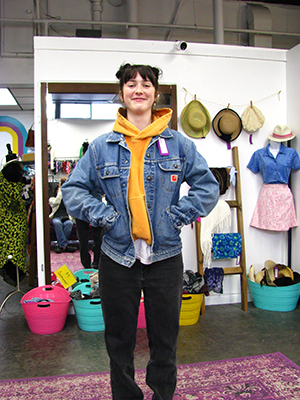Fall Into Cadence: Ava Ugolini interviews Klara du Plessis

UVic work study student Ava Ugolini talks with Klara du Plessis, one of two judges for our 2025 Long Poem Prize (accepting entries now with an Early Bird discount until December 31, 2024). They discuss collaborative work, editing as another form of reading, and how inspiration isn’t static.
Klara du Plessis is a poet, artist-scholar, and literary curator. Her debut poetry collection, Ekke, won the 2019 Pat Lowther Memorial Award and her critical writing received Arc Poetry Magazine’s 2022 Critic’s Desk Award. She is known for her contributions to long-form and translingual poetics, and writes in and between English and Afrikaans. Welcoming collaborative formations, her narrative poem, "Hell Light Flesh," was adapted and produced as a mono-opera film with composer Jimmie LeBlanc, premiered at the International Festival of Films on Art in 2023. Klara develops an ongoing series of experimental and dialogic literary events called Deep Curation, an approach which posits the poetry reading as artform. Her fourth poetry collection, Post-Mortem of the Event, appeared with Palimpsest Press, fall 2024.
You have collaborated with your Long Poem Prize co-judge Khashayar “Kess” Mohammadi which culminated in your co-authored book, G (2023). I know you used a shared Google document, but how was that process? What is the collaborative writing process for you two?
Collaborating with Kess was amazing. We are very much on the same page when it comes to poetics, what we like and so on, and we admire and respect each other’s work. That made the collaboration easy because we could trust each other’s contributions to direct the larger project. I’ve spoken quite a bit elsewhere about composing G early during the COVID19 pandemic, so I’ll comment on our collaborative performances instead. We read sections from G in Ottawa, Toronto, and Vancouver, and did an entire read-through of the book in Montreal. The intimacy of sharing the stage, even the mic, with another poet is not something that you often experience with a solo collection. You get to fall into a cadence with the other voice and this can really differ from performance to performance. On different occasions, Kess and I read the same set of poems with energy and drive, and with a sense of steady melancholy. It’s beautiful and moving to be in sound together.
In the introduction to I’mpossible collab (2023), you mention poetry being inherently collaborative as one interprets a poem’s meaning in their own personal way. I totally agree, and love the idea. Did collaboration with Kess come easy after reading their work? Or were there kinks you two had to work out in order to run smoothly?
The actual writing with Kess was easy and fun. What was perhaps harder was the editorial process, shaping the durational long form of the work. Interestingly, editing is another form of reading. Reading and rereading and rereading your own work to bring about changes in structure, in tone, and so on. To return to my point that reading is collaborative, then, editing as reading was a collaboration with ourselves at a meta level remove. We were collaborating with our past selves. I’m very happy with how the book turned out in the end, but it took some heavy lifting—cutting, reorganizing, and a second spurt of writing—to get from the organic, sprawling manuscript, to a cohesive structure that progressed as a book-length poem from language through translingualism to speech.
With a PhD in English Literature from Concordia University, and pursuing postdoctoral research at UBC Okanagan, how do you balance being an academic and a writer?
I’m not one of those writers who writes every day. I often write the first draft of a manuscript in an outpouring over the space of a few months. Then I don’t write poetry again for a year. The feeling that comes to mind is an opening, that my body opens, that a lot of poetry is released, and that afterwards, something closes itself off again. This doesn’t mean that other elements of writing don’t take up my time, of course. When not writing new poetry, I might be editing or writing prose. I might be working on visual and sound installations, or performances of my work. I might be promoting and touring a book, and applying for new opportunities. So you’re right, life is a lot to juggle and I work very hard, but I also find that my academic career affords me a sense of urgency during the times that I’m not actively writing poetry. It’s complementary, intellectually stimulating, and my research concerns overlap with some of my creative interests too.
I want to know more about your bookcase! Which poetry books, or general literature, have supported you during the course of your literary education and career?
Inspiration isn’t static. I read as much as I can, but what that reading is, keeps changing. My bookcase, as a repository for years of reading, shows some, but not even all, of that exploration. I always intend to return to work, to reread, but I almost never enjoy the experience. I change too much to enjoy work with the same intensity with which it struck me in the past—at the second or third read, my enjoyment is often more analytic in nature.
I’ll tell you what I’m reading right now though. Beside my bed are Oana Avasilichioaei’s new poetry collection, Chambersonic, and Jim Johnstone’s collected critical writing, Bait & Switch. Chambersonic is just brilliant and includes QR codes for related sound works. So reading is also a process of listening. Johnstone’s clear and meticulous prose exposes a whole other side of his practice, and I’m learning a lot about a certain slice of Canadian literature. When my partner isn’t home and I eat a meal alone, I’m reading Renée Gladman’s My Lesbian Novel, a wonderful, formal hybrid that reflects on the writing process through the narration itself. In the bath, I’m reading Stephen Collis’ The Middle, the second poetry collection in an activist, ecological trilogy. In my office are Irene Revell and Sarah Shin’s edited collection, Bodies of Sound—critical essays on tuning the feminist ear—and Achmat Davids’ The Arabic-Afrikaans Writing Tradition, which I’m supposed to review for a South African journal soon. To contradict my earlier statement, I am rereading Breyten Breytenbach’s oorblyfsel / voice over, a homage to Mahmoud Darwish, a few days after Breytenbach’s own passing. Yes, I read many books at once.
Finally, what qualities are you looking for in a winning long poem?
The winning long poem will articulate this to me and not the other way around. While no one can wholly switch off their inherent subjective preferences, I hope not to dictate what this poem will be, but rather to be surprised by the velocity of a work that pushes back against my expectations.

Ava Ugolini









